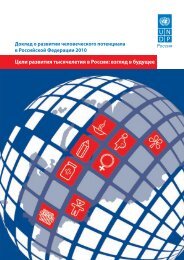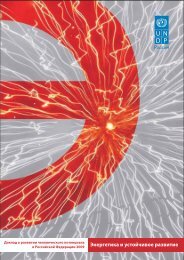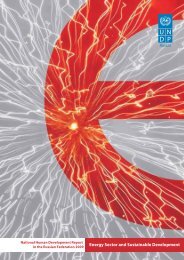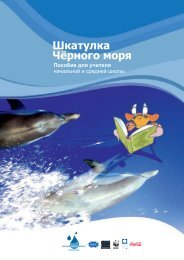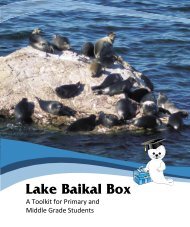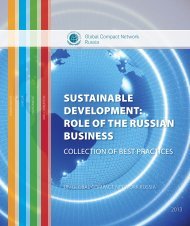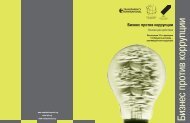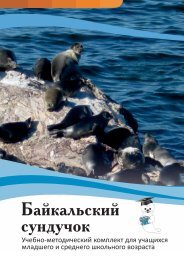Box 5.2. Opportunities for use of carbon market instruments to raisepower efficiency of the <strong>Russia</strong>n economyThe Kyoto Protocol to the United NationsFramework Convention on Climate Change (UNFCCC)is an international environmental agreement, in which<strong>Russia</strong> has a claim to global leadership. <strong>Russia</strong> issuccessfully implementing the institutionalrequirements of the Protocol and is far ahead of itsquantitative commitments with regard to GHGemissions in 2008–2012.Between 1990 and 1999 GHG emissions fellin all segments of the <strong>Russia</strong>n economy due to declineof economic activity. There was some growth ofemissions in both production and consumptionsegments during the period of economic growth from2000 to 2008, but overall GHG emissions in 2008 werestill 34% lower than in 1990.<strong>Russia</strong> has more reserves for reducingemissions with only modest expenditures in the nearfuture than any other developed country. This couldattract massive domestic and foreign investments indevelopment of the energy sector, metallurgy,housing utilities, forestry and other sectors, throughthe establishment of workable national procedures forapproval and registration of joint implementationprojects described in Chapter 6 of the Kyoto Protocol.<strong>Russia</strong> has a great deal to gain from implementation ofthe latest technologies in power production andutilization and views the carbon market as aninstrument for attracting such technologies andknow-how into the <strong>Russia</strong>n economy. As of November2009 over 100 joint implementation projects havebeen prepared in <strong>Russia</strong>. These projects have thepotential for reducing emissions by over 200 m.t. inCO 2 equivalent between 2008 and 2012.Another way of attracting much-neededinvestments is the utilization of ’green’ investmentscheme (GIS), which was first proposed by the <strong>Russia</strong>ndelegation at the 6th Conference of Parties UNFCCC(Hague) in 2000. GIS is an innovative financialmechanism, based on a voluntary country’s obligationto reinvest income from sales of national quotas insupport of energy efficiency and renewable energydevelopment projects.Experts estimate that the unused portion of<strong>Russia</strong>’s GHG emissions in the first budget period ofthe Kyoto Protocol (2008–2012) could amount toabout 5-6 billion m.t. in CO 2 equivalent, depending oneconomic development rates and energy savingscenarios. Clearly, there will not be sufficient demandto absorb such a large volume in the first budgetperiod and, even in the most optimistic scenario,<strong>Russia</strong> will only be able to sell a small portion of itsreserve through the GIS. However, this could beenough to stimulate significant foreign investments.Environmental protection expenditures in<strong>Russia</strong> are less than 0.5% of GDP, which is less than inother developed countries. Implementation of the GIScould catalyze an increase of environmentalinvestments in both the state and private sectors. GISin <strong>Russia</strong> could become the locomotive for deepmodernization of the environment managementsystem, providing additional economic advantagesand institutional innovations.In 2010 we anticipate preparation of anumber of pilot GIS operations, based on theGovernment Directive No.884-r, dated June 27, 2009,which calls on the Ministry of Economic Development,the Ministry for Foreign Affairs and Sberbank (thenational savings bank) to hold negotiations withrelevant national authorities of interested countrieson participation in GHG emissions trading projects.This Directive assigns Sberbank as the authorizedorganization for implementing pilot GHG tradingprojects in pursuance of Article 17 of the KyotoProtocol.Section 13 of Article 3 of the Kyoto Protocoloffers the possibility of carrying over unusedemissions quotas from the first budget period tosubsequent budget periods. <strong>Russia</strong>, Ukraine, Polandand other Eastern and Central European countries willhave a significant surplus of GHG emission quotas inthe first budget period and would like these surplusemissions to be carried over. However, the procedurefor registering and carrying over the accumulatedsurplus of national quotas to subsequent periodscould become a stumbling block in the negotiations,as it affects the interests of all main groups ofcountries.<strong>Russia</strong>’s unused GHG emission quotas couldnot only be used as an additional instrument forextensive development, but as a resource to helpfinance transition of the main sectors of <strong>Russia</strong>’seconomy to energy-saving and resource-savingdevelopment. It also seems practical to explore thepossibility of creating an international financial106 National Human Development <strong>Report</strong> in the <strong>Russia</strong>n Federation 2009
mechanism for using national quota reserves toensure that developed countries assume and fulfilladditional obligations. The idea would be possiblewaiver by <strong>Russia</strong> and the Ukraine of their right to usea large portion of their forecast reserve to increasetheir quotas in the subsequent period, in exchange forguaranteed amounts of financing for GHG emissionreduction projects. These reductions could be fullyaccounted, or accounted at a certain discount, bythese countries when they assume quantitativecommitments for reductions in the next period. At thesame time the United States, Canada and othercountries with relatively high emission reduction costscould use the mechanism in order to assume tougherreduction commitments while keeping theirexpenditures within limits. The idea of exchangingquota reserves for environmental investments couldbe included in the new international agreement onclimate change for the period after 2012.Increasing numbers of experts are of theopinion that <strong>Russia</strong> needs to start work on a nationalGHGs cap-and-trade system, which should becompatible with international carbon market systems.The target is to create incentives for businesses toreduce emissions and to increase energy efficiency byflexible and cost-efficient methods.A regional carbon market has been inoperations in the EU since 2005, and most leadingcountries (the USA, Japan, Australia, New Zealand) arealso preparing to introduce national carbon markets.The EU is calling for creation of a global carbon marketamong OECD members by 2015.The Copenhagen Accord includes a pledgeby developed countries to provide USD 30 billion todeveloping countries in 2010–2012 for preparationand adaptation to global climate change. <strong>Russia</strong>, asa member of the G8, has declared its readiness to bea donor. It is worth considering the stance taken byPoland, which plans to make the level of itsdonations depend on the amount of income itreceives from selling a part of its national GHGemissions quotas.The immediate task is to determine thepriorities, forms and mechanisms of <strong>Russia</strong>’s financialinput to the new global financial climate initiatives.There may be scope for partner countries, whichrequire <strong>Russia</strong>n aid, to use <strong>Russia</strong>n donor assistance.<strong>Russia</strong> could propose a financial aid programme tohelp Trans-Caucasian and Central Asian countriesadapt to and cushion the impact of global climatechange. A regional carbon market initiative could alsobe considered.107
- Page 1 and 2:
National Human Development Reportin
- Page 3 and 4:
National Human Development Reportin
- Page 5 and 6:
ACKNOWLEDGEMENTSThe authors express
- Page 7 and 8:
Dear Reader,You have before you the
- Page 9 and 10:
PREFACEThis is the 13 th National H
- Page 11 and 12:
country’s fuel & energy regions r
- Page 13 and 14:
environmental degradation and enhan
- Page 15 and 16:
Chapter 1The Energy Sector,the Econ
- Page 17 and 18:
By 2008 Russia had increased its sh
- Page 19 and 20:
the share of energy in the national
- Page 21 and 22:
exported, increased. However, this
- Page 23 and 24:
elimination of structural and terri
- Page 25 and 26:
• Establishment of competitive me
- Page 27 and 28:
number of developed countries, incl
- Page 29 and 30:
Although the United Nations Climate
- Page 31 and 32:
industrial region of the Urals - Sv
- Page 33 and 34:
2.2. Budget capacityand structure o
- Page 35 and 36:
(the Federal State Statistics Servi
- Page 37 and 38:
Immigration by young and highly ski
- Page 39 and 40:
energy regions exacerbate the incom
- Page 41 and 42:
Khanty-Mansi and Yamal-Nenets Auton
- Page 43 and 44:
the Ministry for Regional Developme
- Page 45 and 46:
various other long-term problems in
- Page 47 and 48:
is also associated with the fuel an
- Page 49 and 50:
Republic of Mordovia 8051 0.732 68.
- Page 51 and 52:
Legislative control of impact audit
- Page 53 and 54:
Chapter 3Personal Incomes, the Ener
- Page 55 and 56:
than any other sources of income -
- Page 57 and 58: Are wages now the main instrument f
- Page 59 and 60: comparison of month-on-month develo
- Page 61 and 62: • The unemployed, people who aree
- Page 63 and 64: Employment in the energy sector acc
- Page 65 and 66: The share of household expenditures
- Page 67 and 68: subsidization practices in the regi
- Page 69 and 70: in power use between regions now de
- Page 71 and 72: Electricity prices for households h
- Page 73 and 74: • Steady decrease in the percenta
- Page 75 and 76: 1. The number of graduates with eng
- Page 77 and 78: As well as requiring better fuelcom
- Page 79 and 80: Box 4.1. The village of Kolvain Uss
- Page 81 and 82: continue to use solid fuel for a lo
- Page 83 and 84: Box 4.3. Ambient air pollution andp
- Page 85 and 86: either by large power generating fa
- Page 87 and 88: Box 4.6. A city at riskNovocherkass
- Page 89 and 90: In order to assess impact of thesee
- Page 91 and 92: generation facilities through safer
- Page 93 and 94: achieved in developed countries. So
- Page 95 and 96: equires 2-6 times more capital inve
- Page 97 and 98: government) should set targets and
- Page 99 and 100: networks. In 2007 government budget
- Page 101 and 102: enhancement is also important. Ener
- Page 103 and 104: energy efficiency of the transport
- Page 105 and 106: Box 5.1. Programme of the Ministry
- Page 107: educational and informational suppo
- Page 111 and 112: Figure 6.2Share of electricity gene
- Page 113 and 114: One of the major benefits of renewa
- Page 115 and 116: odies; outdoor air; rocks and soil;
- Page 117 and 118: Design and construction of geotherm
- Page 119 and 120: Box 6.3. Prospects for nuclear powe
- Page 121 and 122: consists of out-dated equipment at
- Page 123 and 124: ConclusionThe world’s nuclear pow
- Page 125 and 126: 7.1. Impact of the fuel& energy sec
- Page 127 and 128: Table 7.5Solid waste from productio
- Page 129 and 130: Table 7.7Areas of disturbed and rec
- Page 131 and 132: nature of the impact (atmospheric e
- Page 133 and 134: Further, the economic cost ofenviro
- Page 135 and 136: trends continued the damage would a
- Page 137 and 138: What the government needs to do ino
- Page 139 and 140: Figure 7.2.1Specific atmospheric em
- Page 141 and 142: money value of industrial output) c
- Page 143 and 144: Figure 7.2.4Trends in specific atmo
- Page 145 and 146: Chapter 8The Energy Industry and Su
- Page 147 and 148: eing equal) it only reflects that p
- Page 149 and 150: (MDGs), issued by the UN in 2000. T
- Page 151 and 152: 8.4. The energy factorin integral i
- Page 153 and 154: Canada, the USA and Great Britain h
- Page 155 and 156: Box 8.2. Energy efficiencyindicator
- Page 157 and 158: Box 8.4. Energy efficiency rating o
- Page 159 and 160:
41 Penza Region 116.0 -35.2 -4.542
- Page 161 and 162:
Appendix to Chapter 1Table 1.1. GDP
- Page 163 and 164:
Attachment to Chapter 4Table 4.1Rus
- Page 165 and 166:
Attachment to Chapter 4Volga Federa
- Page 167 and 168:
Attachment to Chapter 4Belovo Belov
- Page 169 and 170:
The previous National Human Develop



